UOP BAAFM P23001 Auditing Assignment: Financial Analysis
VerifiedAdded on 2022/09/14
|9
|2013
|14
Report
AI Summary
This report provides a comprehensive analysis of auditing principles, focusing on the objectives of financial statement audits and the crucial concept of auditor independence. It delves into the importance of an auditor's unbiased opinion and its impact on investors' decisions. The report explores relevant auditing standards, potential threats to auditor independence, and real-world examples, including the Enron and Mattel cases, to illustrate the consequences of compromised independence. Furthermore, the report examines audit risks such as overstatement of revenue, misstatements in revenue collection, and product recalls. It outlines the auditor's responses in terms of planning and the importance of internal controls, including password protection in computerized inventory systems. The report also details four tests of control that auditors can use to ensure the proper functioning of these systems. This analysis is essential for understanding the complexities of financial auditing and the measures needed to maintain audit quality and reliability.
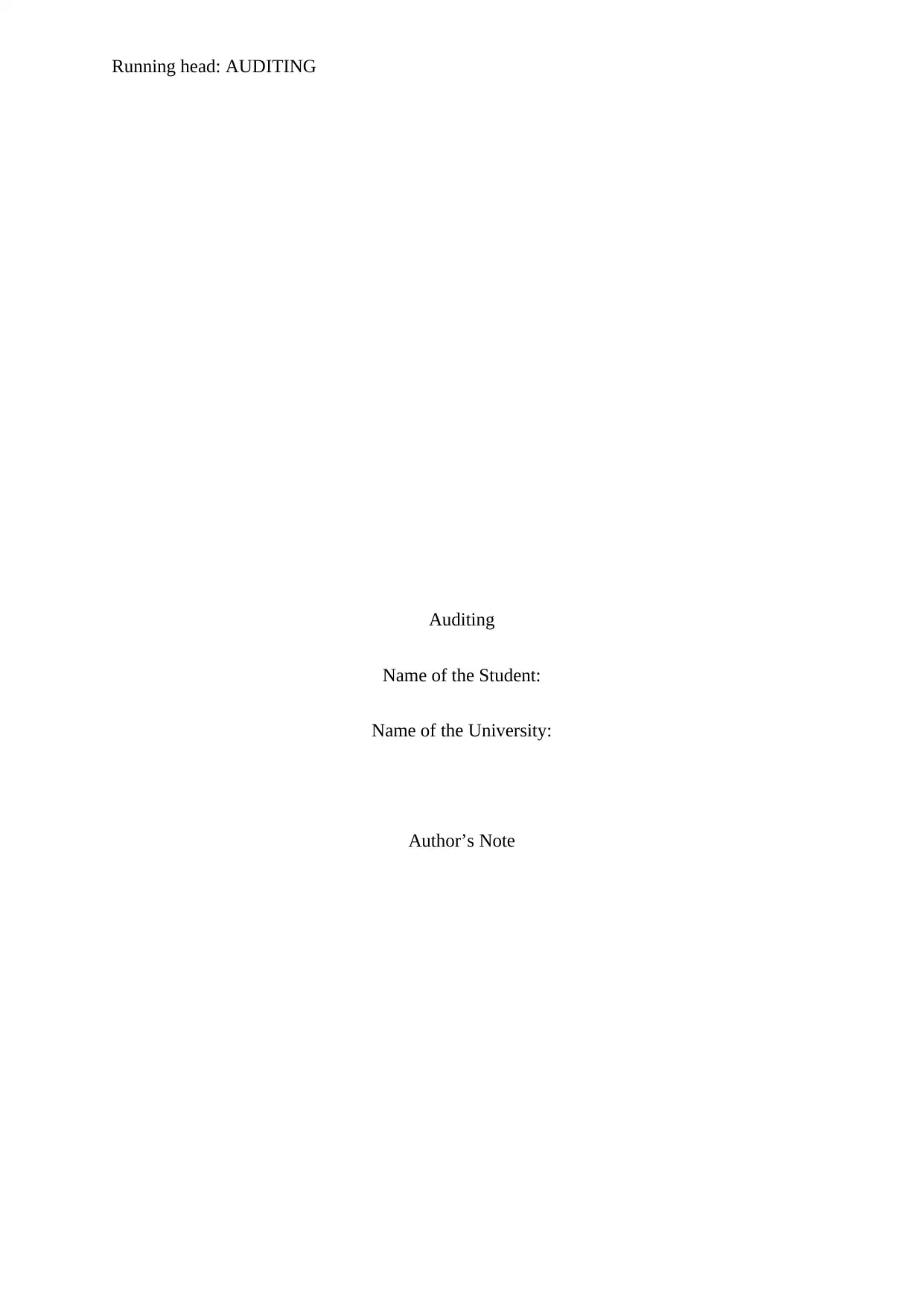
Running head: AUDITING
Auditing
Name of the Student:
Name of the University:
Author’s Note
Auditing
Name of the Student:
Name of the University:
Author’s Note
Paraphrase This Document
Need a fresh take? Get an instant paraphrase of this document with our AI Paraphraser
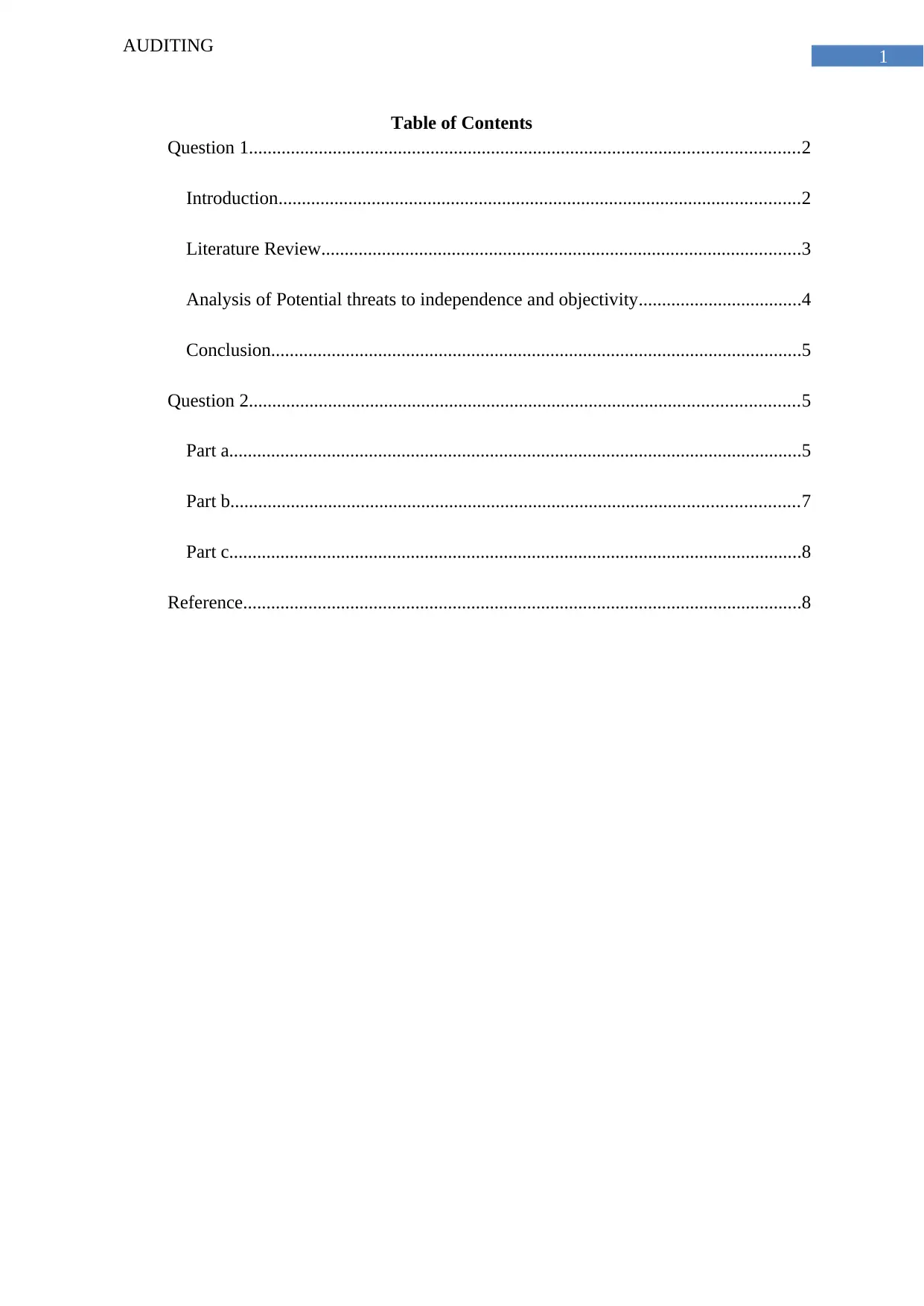
1
AUDITING
Table of Contents
Question 1......................................................................................................................2
Introduction................................................................................................................2
Literature Review.......................................................................................................3
Analysis of Potential threats to independence and objectivity...................................4
Conclusion..................................................................................................................5
Question 2......................................................................................................................5
Part a...........................................................................................................................5
Part b..........................................................................................................................7
Part c...........................................................................................................................8
Reference........................................................................................................................8
AUDITING
Table of Contents
Question 1......................................................................................................................2
Introduction................................................................................................................2
Literature Review.......................................................................................................3
Analysis of Potential threats to independence and objectivity...................................4
Conclusion..................................................................................................................5
Question 2......................................................................................................................5
Part a...........................................................................................................................5
Part b..........................................................................................................................7
Part c...........................................................................................................................8
Reference........................................................................................................................8
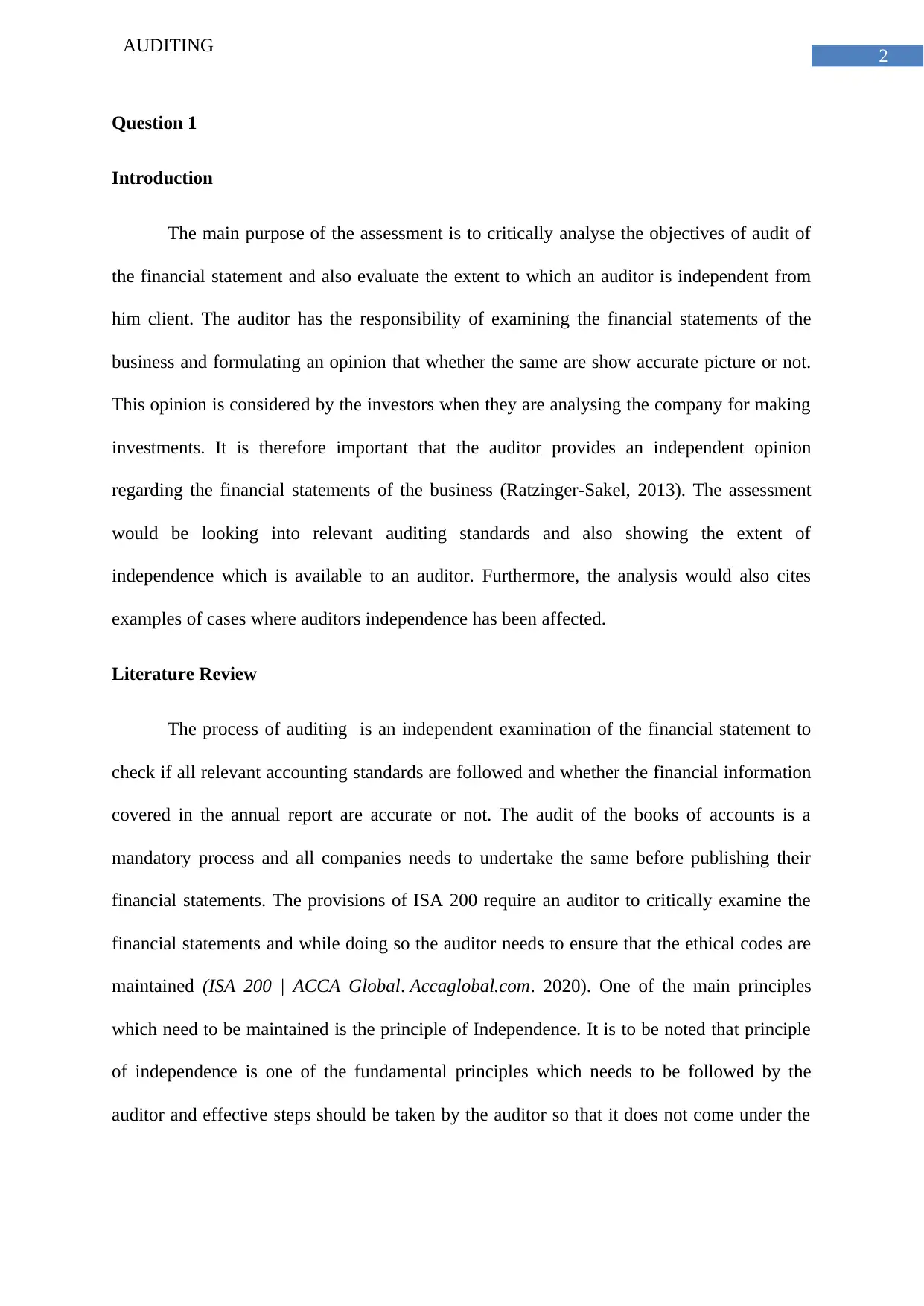
2
AUDITING
Question 1
Introduction
The main purpose of the assessment is to critically analyse the objectives of audit of
the financial statement and also evaluate the extent to which an auditor is independent from
him client. The auditor has the responsibility of examining the financial statements of the
business and formulating an opinion that whether the same are show accurate picture or not.
This opinion is considered by the investors when they are analysing the company for making
investments. It is therefore important that the auditor provides an independent opinion
regarding the financial statements of the business (Ratzinger-Sakel, 2013). The assessment
would be looking into relevant auditing standards and also showing the extent of
independence which is available to an auditor. Furthermore, the analysis would also cites
examples of cases where auditors independence has been affected.
Literature Review
The process of auditing is an independent examination of the financial statement to
check if all relevant accounting standards are followed and whether the financial information
covered in the annual report are accurate or not. The audit of the books of accounts is a
mandatory process and all companies needs to undertake the same before publishing their
financial statements. The provisions of ISA 200 require an auditor to critically examine the
financial statements and while doing so the auditor needs to ensure that the ethical codes are
maintained (ISA 200 | ACCA Global. Accaglobal.com. 2020). One of the main principles
which need to be maintained is the principle of Independence. It is to be noted that principle
of independence is one of the fundamental principles which needs to be followed by the
auditor and effective steps should be taken by the auditor so that it does not come under the
AUDITING
Question 1
Introduction
The main purpose of the assessment is to critically analyse the objectives of audit of
the financial statement and also evaluate the extent to which an auditor is independent from
him client. The auditor has the responsibility of examining the financial statements of the
business and formulating an opinion that whether the same are show accurate picture or not.
This opinion is considered by the investors when they are analysing the company for making
investments. It is therefore important that the auditor provides an independent opinion
regarding the financial statements of the business (Ratzinger-Sakel, 2013). The assessment
would be looking into relevant auditing standards and also showing the extent of
independence which is available to an auditor. Furthermore, the analysis would also cites
examples of cases where auditors independence has been affected.
Literature Review
The process of auditing is an independent examination of the financial statement to
check if all relevant accounting standards are followed and whether the financial information
covered in the annual report are accurate or not. The audit of the books of accounts is a
mandatory process and all companies needs to undertake the same before publishing their
financial statements. The provisions of ISA 200 require an auditor to critically examine the
financial statements and while doing so the auditor needs to ensure that the ethical codes are
maintained (ISA 200 | ACCA Global. Accaglobal.com. 2020). One of the main principles
which need to be maintained is the principle of Independence. It is to be noted that principle
of independence is one of the fundamental principles which needs to be followed by the
auditor and effective steps should be taken by the auditor so that it does not come under the
⊘ This is a preview!⊘
Do you want full access?
Subscribe today to unlock all pages.

Trusted by 1+ million students worldwide
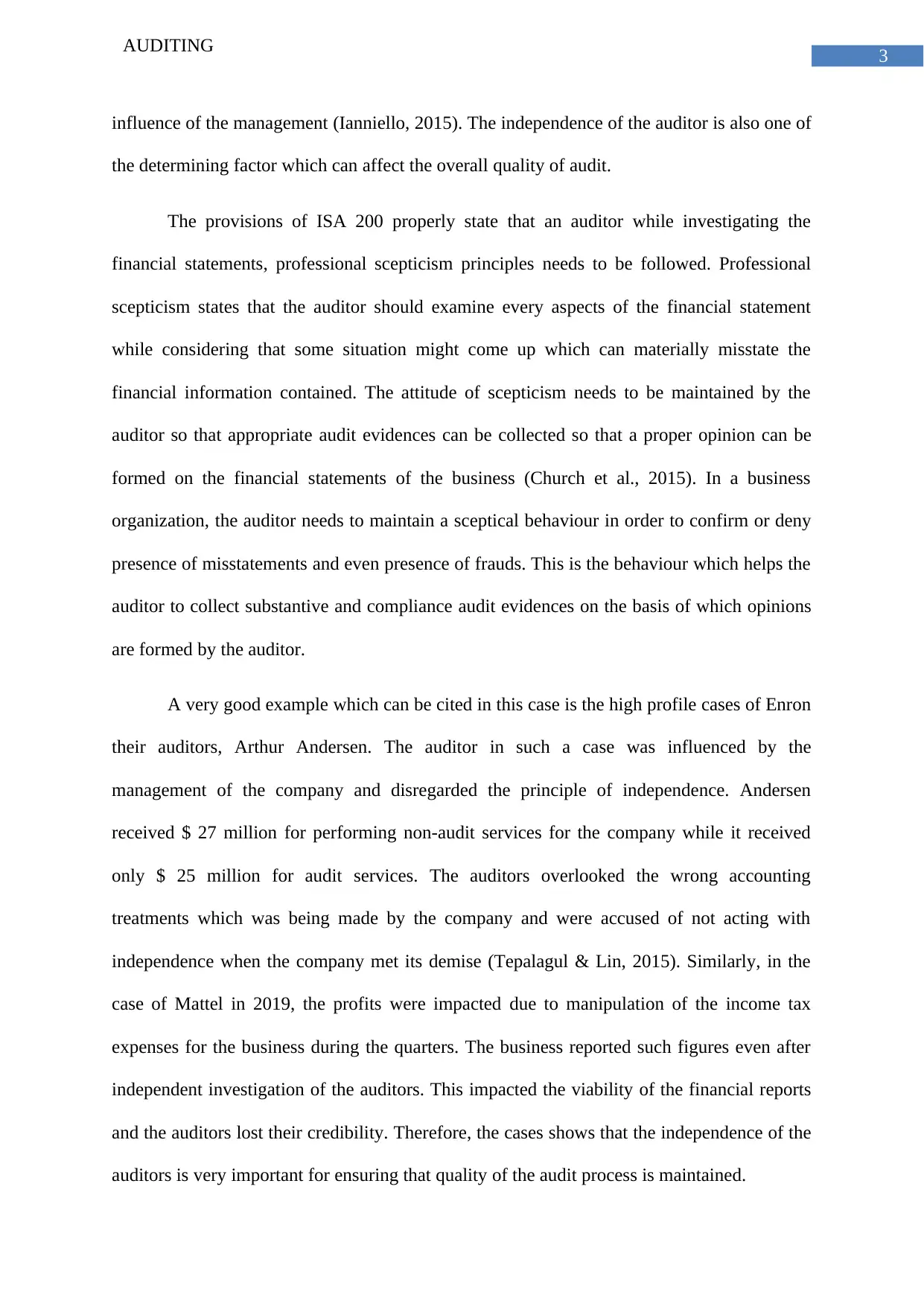
3
AUDITING
influence of the management (Ianniello, 2015). The independence of the auditor is also one of
the determining factor which can affect the overall quality of audit.
The provisions of ISA 200 properly state that an auditor while investigating the
financial statements, professional scepticism principles needs to be followed. Professional
scepticism states that the auditor should examine every aspects of the financial statement
while considering that some situation might come up which can materially misstate the
financial information contained. The attitude of scepticism needs to be maintained by the
auditor so that appropriate audit evidences can be collected so that a proper opinion can be
formed on the financial statements of the business (Church et al., 2015). In a business
organization, the auditor needs to maintain a sceptical behaviour in order to confirm or deny
presence of misstatements and even presence of frauds. This is the behaviour which helps the
auditor to collect substantive and compliance audit evidences on the basis of which opinions
are formed by the auditor.
A very good example which can be cited in this case is the high profile cases of Enron
their auditors, Arthur Andersen. The auditor in such a case was influenced by the
management of the company and disregarded the principle of independence. Andersen
received $ 27 million for performing non-audit services for the company while it received
only $ 25 million for audit services. The auditors overlooked the wrong accounting
treatments which was being made by the company and were accused of not acting with
independence when the company met its demise (Tepalagul & Lin, 2015). Similarly, in the
case of Mattel in 2019, the profits were impacted due to manipulation of the income tax
expenses for the business during the quarters. The business reported such figures even after
independent investigation of the auditors. This impacted the viability of the financial reports
and the auditors lost their credibility. Therefore, the cases shows that the independence of the
auditors is very important for ensuring that quality of the audit process is maintained.
AUDITING
influence of the management (Ianniello, 2015). The independence of the auditor is also one of
the determining factor which can affect the overall quality of audit.
The provisions of ISA 200 properly state that an auditor while investigating the
financial statements, professional scepticism principles needs to be followed. Professional
scepticism states that the auditor should examine every aspects of the financial statement
while considering that some situation might come up which can materially misstate the
financial information contained. The attitude of scepticism needs to be maintained by the
auditor so that appropriate audit evidences can be collected so that a proper opinion can be
formed on the financial statements of the business (Church et al., 2015). In a business
organization, the auditor needs to maintain a sceptical behaviour in order to confirm or deny
presence of misstatements and even presence of frauds. This is the behaviour which helps the
auditor to collect substantive and compliance audit evidences on the basis of which opinions
are formed by the auditor.
A very good example which can be cited in this case is the high profile cases of Enron
their auditors, Arthur Andersen. The auditor in such a case was influenced by the
management of the company and disregarded the principle of independence. Andersen
received $ 27 million for performing non-audit services for the company while it received
only $ 25 million for audit services. The auditors overlooked the wrong accounting
treatments which was being made by the company and were accused of not acting with
independence when the company met its demise (Tepalagul & Lin, 2015). Similarly, in the
case of Mattel in 2019, the profits were impacted due to manipulation of the income tax
expenses for the business during the quarters. The business reported such figures even after
independent investigation of the auditors. This impacted the viability of the financial reports
and the auditors lost their credibility. Therefore, the cases shows that the independence of the
auditors is very important for ensuring that quality of the audit process is maintained.
Paraphrase This Document
Need a fresh take? Get an instant paraphrase of this document with our AI Paraphraser
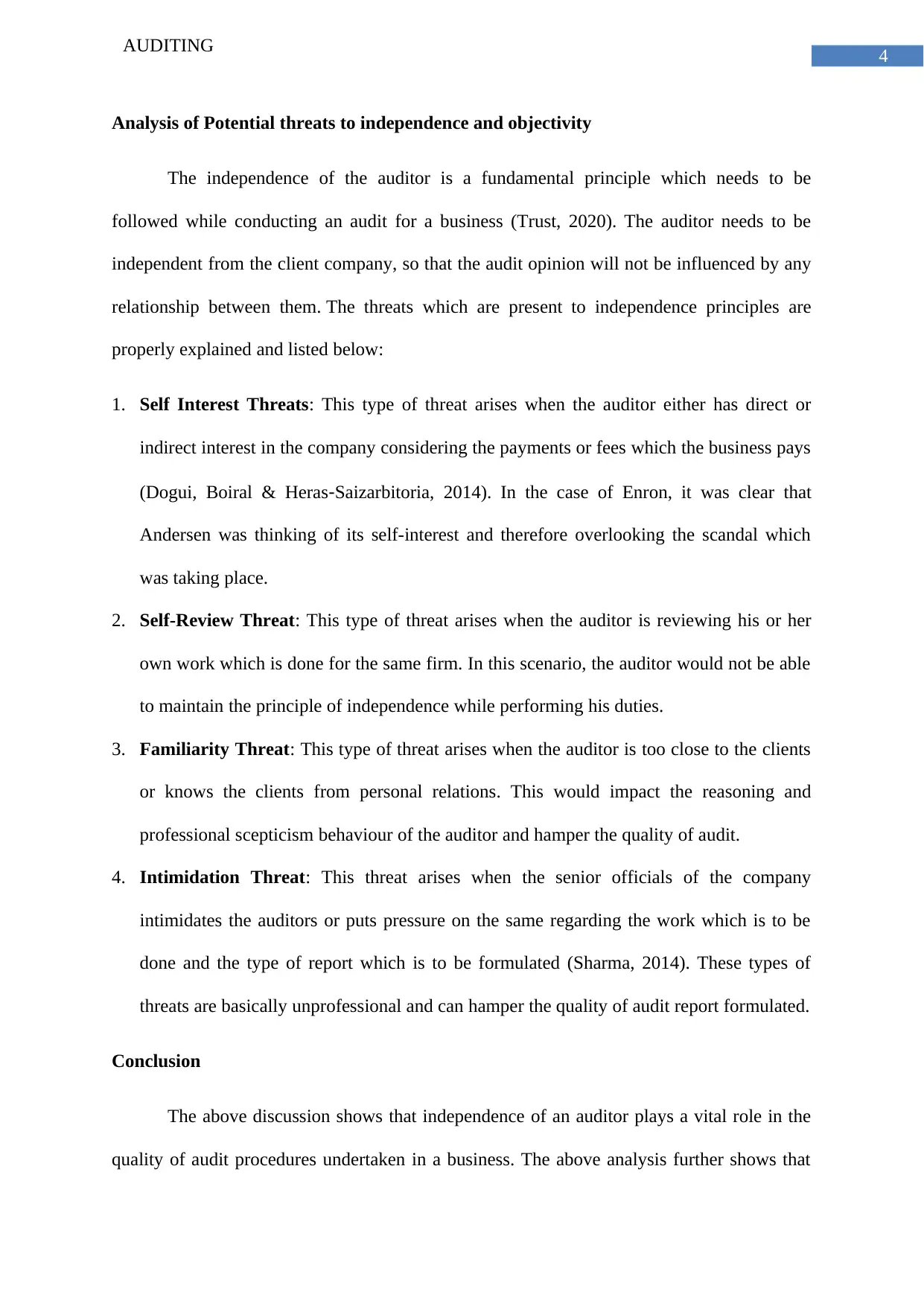
4
AUDITING
Analysis of Potential threats to independence and objectivity
The independence of the auditor is a fundamental principle which needs to be
followed while conducting an audit for a business (Trust, 2020). The auditor needs to be
independent from the client company, so that the audit opinion will not be influenced by any
relationship between them. The threats which are present to independence principles are
properly explained and listed below:
1. Self Interest Threats: This type of threat arises when the auditor either has direct or
indirect interest in the company considering the payments or fees which the business pays
(Dogui, Boiral & Heras‐Saizarbitoria, 2014). In the case of Enron, it was clear that
Andersen was thinking of its self-interest and therefore overlooking the scandal which
was taking place.
2. Self-Review Threat: This type of threat arises when the auditor is reviewing his or her
own work which is done for the same firm. In this scenario, the auditor would not be able
to maintain the principle of independence while performing his duties.
3. Familiarity Threat: This type of threat arises when the auditor is too close to the clients
or knows the clients from personal relations. This would impact the reasoning and
professional scepticism behaviour of the auditor and hamper the quality of audit.
4. Intimidation Threat: This threat arises when the senior officials of the company
intimidates the auditors or puts pressure on the same regarding the work which is to be
done and the type of report which is to be formulated (Sharma, 2014). These types of
threats are basically unprofessional and can hamper the quality of audit report formulated.
Conclusion
The above discussion shows that independence of an auditor plays a vital role in the
quality of audit procedures undertaken in a business. The above analysis further shows that
AUDITING
Analysis of Potential threats to independence and objectivity
The independence of the auditor is a fundamental principle which needs to be
followed while conducting an audit for a business (Trust, 2020). The auditor needs to be
independent from the client company, so that the audit opinion will not be influenced by any
relationship between them. The threats which are present to independence principles are
properly explained and listed below:
1. Self Interest Threats: This type of threat arises when the auditor either has direct or
indirect interest in the company considering the payments or fees which the business pays
(Dogui, Boiral & Heras‐Saizarbitoria, 2014). In the case of Enron, it was clear that
Andersen was thinking of its self-interest and therefore overlooking the scandal which
was taking place.
2. Self-Review Threat: This type of threat arises when the auditor is reviewing his or her
own work which is done for the same firm. In this scenario, the auditor would not be able
to maintain the principle of independence while performing his duties.
3. Familiarity Threat: This type of threat arises when the auditor is too close to the clients
or knows the clients from personal relations. This would impact the reasoning and
professional scepticism behaviour of the auditor and hamper the quality of audit.
4. Intimidation Threat: This threat arises when the senior officials of the company
intimidates the auditors or puts pressure on the same regarding the work which is to be
done and the type of report which is to be formulated (Sharma, 2014). These types of
threats are basically unprofessional and can hamper the quality of audit report formulated.
Conclusion
The above discussion shows that independence of an auditor plays a vital role in the
quality of audit procedures undertaken in a business. The above analysis further shows that
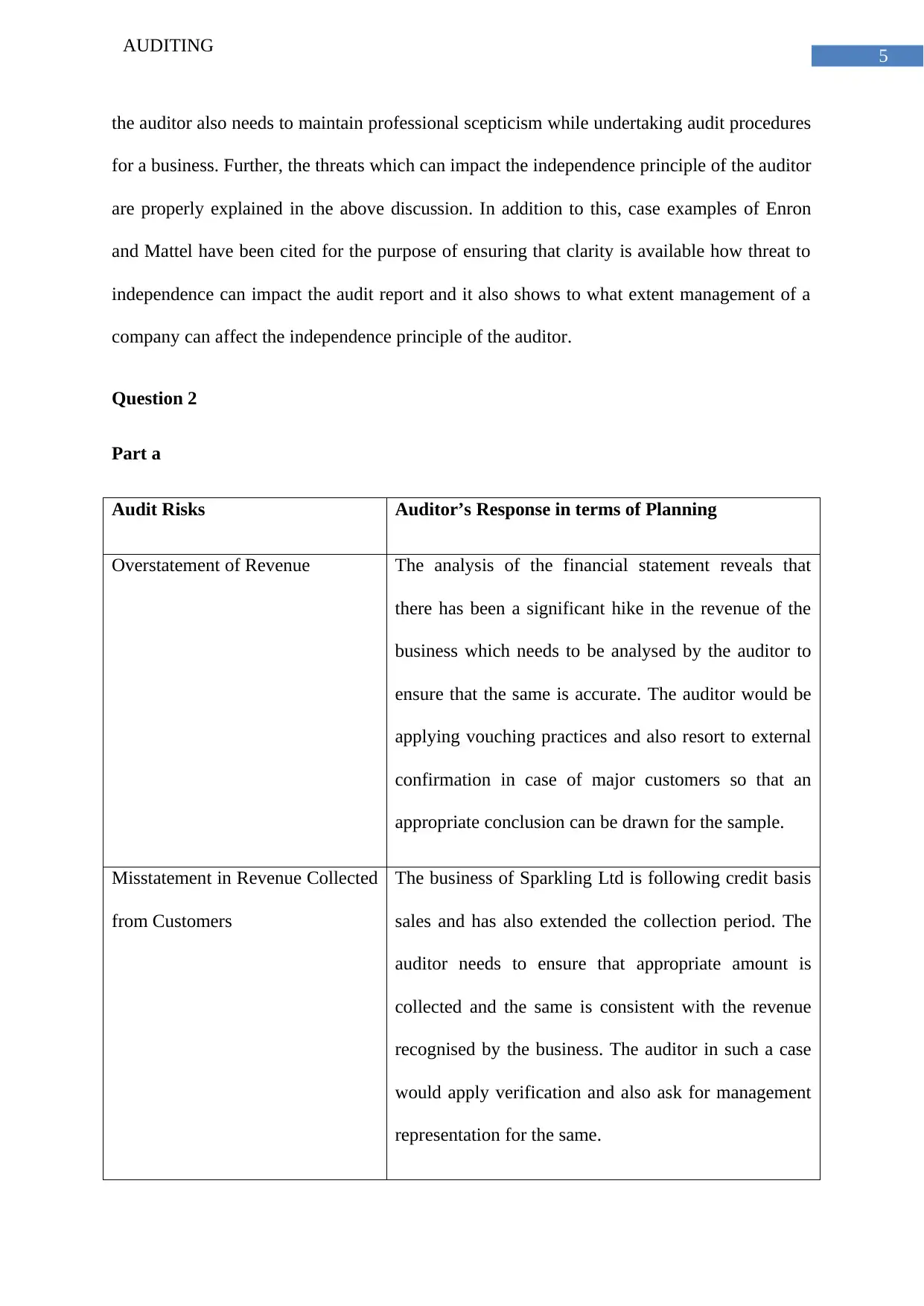
5
AUDITING
the auditor also needs to maintain professional scepticism while undertaking audit procedures
for a business. Further, the threats which can impact the independence principle of the auditor
are properly explained in the above discussion. In addition to this, case examples of Enron
and Mattel have been cited for the purpose of ensuring that clarity is available how threat to
independence can impact the audit report and it also shows to what extent management of a
company can affect the independence principle of the auditor.
Question 2
Part a
Audit Risks Auditor’s Response in terms of Planning
Overstatement of Revenue The analysis of the financial statement reveals that
there has been a significant hike in the revenue of the
business which needs to be analysed by the auditor to
ensure that the same is accurate. The auditor would be
applying vouching practices and also resort to external
confirmation in case of major customers so that an
appropriate conclusion can be drawn for the sample.
Misstatement in Revenue Collected
from Customers
The business of Sparkling Ltd is following credit basis
sales and has also extended the collection period. The
auditor needs to ensure that appropriate amount is
collected and the same is consistent with the revenue
recognised by the business. The auditor in such a case
would apply verification and also ask for management
representation for the same.
AUDITING
the auditor also needs to maintain professional scepticism while undertaking audit procedures
for a business. Further, the threats which can impact the independence principle of the auditor
are properly explained in the above discussion. In addition to this, case examples of Enron
and Mattel have been cited for the purpose of ensuring that clarity is available how threat to
independence can impact the audit report and it also shows to what extent management of a
company can affect the independence principle of the auditor.
Question 2
Part a
Audit Risks Auditor’s Response in terms of Planning
Overstatement of Revenue The analysis of the financial statement reveals that
there has been a significant hike in the revenue of the
business which needs to be analysed by the auditor to
ensure that the same is accurate. The auditor would be
applying vouching practices and also resort to external
confirmation in case of major customers so that an
appropriate conclusion can be drawn for the sample.
Misstatement in Revenue Collected
from Customers
The business of Sparkling Ltd is following credit basis
sales and has also extended the collection period. The
auditor needs to ensure that appropriate amount is
collected and the same is consistent with the revenue
recognised by the business. The auditor in such a case
would apply verification and also ask for management
representation for the same.
⊘ This is a preview!⊘
Do you want full access?
Subscribe today to unlock all pages.

Trusted by 1+ million students worldwide
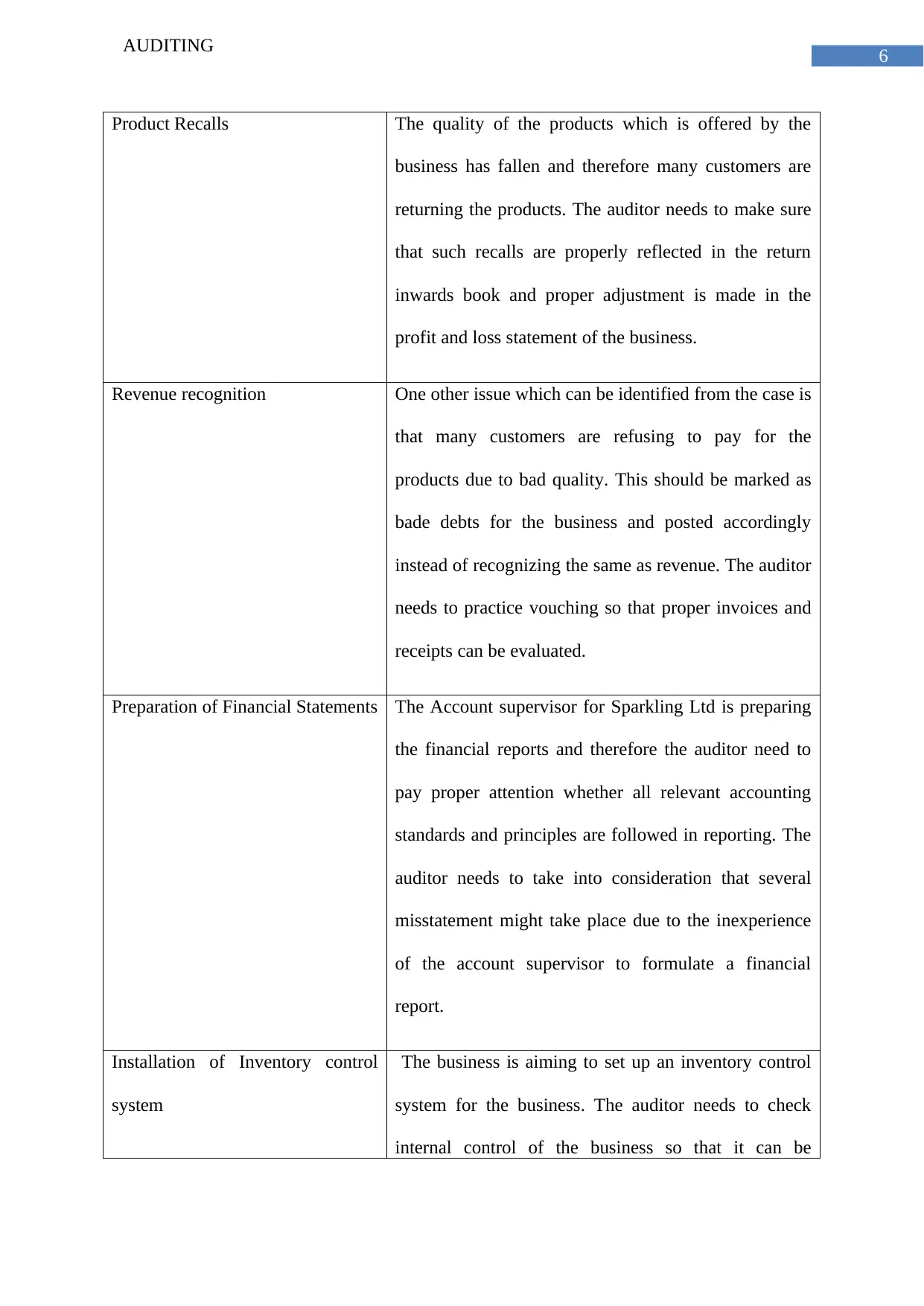
6
AUDITING
Product Recalls The quality of the products which is offered by the
business has fallen and therefore many customers are
returning the products. The auditor needs to make sure
that such recalls are properly reflected in the return
inwards book and proper adjustment is made in the
profit and loss statement of the business.
Revenue recognition One other issue which can be identified from the case is
that many customers are refusing to pay for the
products due to bad quality. This should be marked as
bade debts for the business and posted accordingly
instead of recognizing the same as revenue. The auditor
needs to practice vouching so that proper invoices and
receipts can be evaluated.
Preparation of Financial Statements The Account supervisor for Sparkling Ltd is preparing
the financial reports and therefore the auditor need to
pay proper attention whether all relevant accounting
standards and principles are followed in reporting. The
auditor needs to take into consideration that several
misstatement might take place due to the inexperience
of the account supervisor to formulate a financial
report.
Installation of Inventory control
system
The business is aiming to set up an inventory control
system for the business. The auditor needs to check
internal control of the business so that it can be
AUDITING
Product Recalls The quality of the products which is offered by the
business has fallen and therefore many customers are
returning the products. The auditor needs to make sure
that such recalls are properly reflected in the return
inwards book and proper adjustment is made in the
profit and loss statement of the business.
Revenue recognition One other issue which can be identified from the case is
that many customers are refusing to pay for the
products due to bad quality. This should be marked as
bade debts for the business and posted accordingly
instead of recognizing the same as revenue. The auditor
needs to practice vouching so that proper invoices and
receipts can be evaluated.
Preparation of Financial Statements The Account supervisor for Sparkling Ltd is preparing
the financial reports and therefore the auditor need to
pay proper attention whether all relevant accounting
standards and principles are followed in reporting. The
auditor needs to take into consideration that several
misstatement might take place due to the inexperience
of the account supervisor to formulate a financial
report.
Installation of Inventory control
system
The business is aiming to set up an inventory control
system for the business. The auditor needs to check
internal control of the business so that it can be
Paraphrase This Document
Need a fresh take? Get an instant paraphrase of this document with our AI Paraphraser
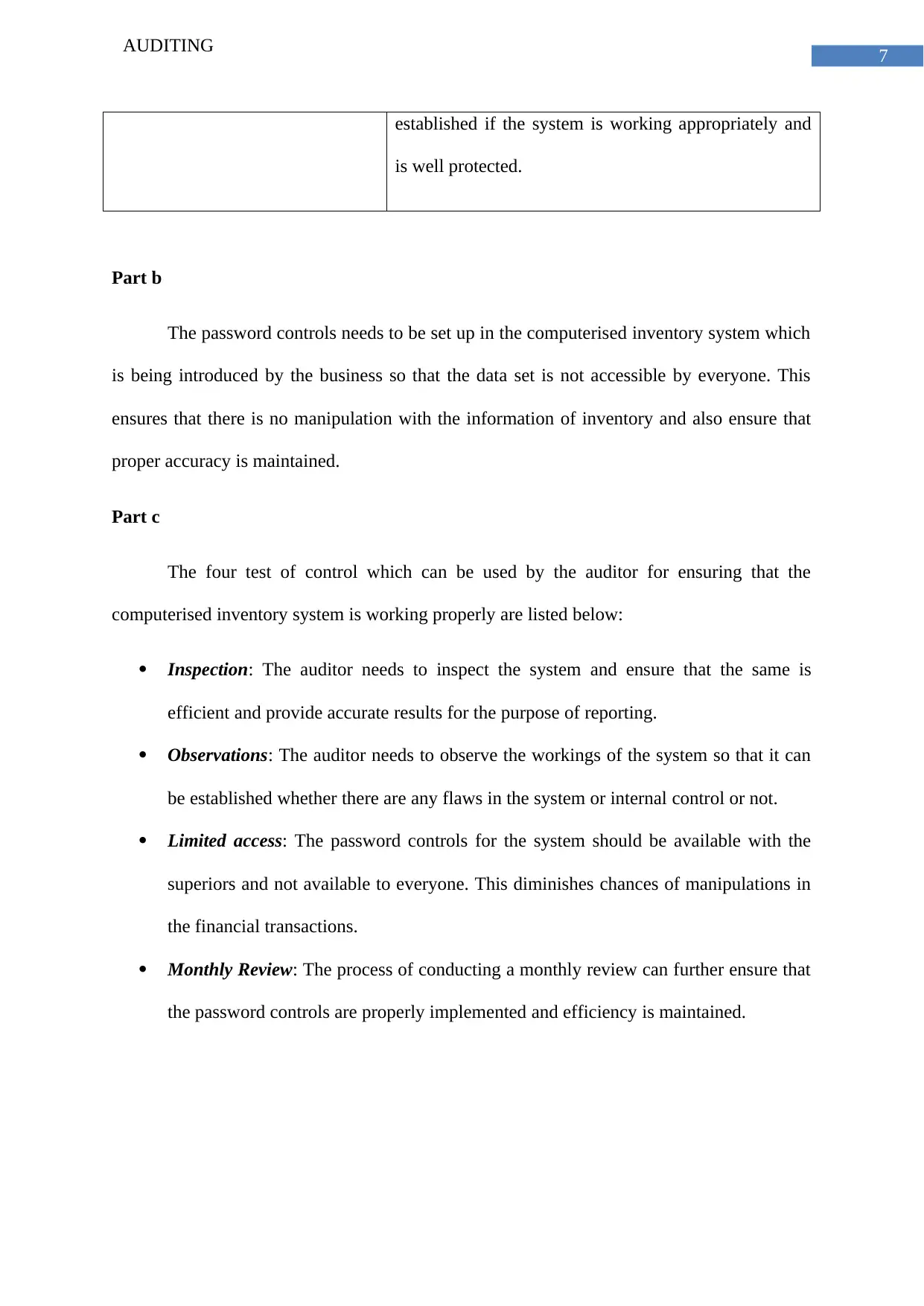
7
AUDITING
established if the system is working appropriately and
is well protected.
Part b
The password controls needs to be set up in the computerised inventory system which
is being introduced by the business so that the data set is not accessible by everyone. This
ensures that there is no manipulation with the information of inventory and also ensure that
proper accuracy is maintained.
Part c
The four test of control which can be used by the auditor for ensuring that the
computerised inventory system is working properly are listed below:
Inspection: The auditor needs to inspect the system and ensure that the same is
efficient and provide accurate results for the purpose of reporting.
Observations: The auditor needs to observe the workings of the system so that it can
be established whether there are any flaws in the system or internal control or not.
Limited access: The password controls for the system should be available with the
superiors and not available to everyone. This diminishes chances of manipulations in
the financial transactions.
Monthly Review: The process of conducting a monthly review can further ensure that
the password controls are properly implemented and efficiency is maintained.
AUDITING
established if the system is working appropriately and
is well protected.
Part b
The password controls needs to be set up in the computerised inventory system which
is being introduced by the business so that the data set is not accessible by everyone. This
ensures that there is no manipulation with the information of inventory and also ensure that
proper accuracy is maintained.
Part c
The four test of control which can be used by the auditor for ensuring that the
computerised inventory system is working properly are listed below:
Inspection: The auditor needs to inspect the system and ensure that the same is
efficient and provide accurate results for the purpose of reporting.
Observations: The auditor needs to observe the workings of the system so that it can
be established whether there are any flaws in the system or internal control or not.
Limited access: The password controls for the system should be available with the
superiors and not available to everyone. This diminishes chances of manipulations in
the financial transactions.
Monthly Review: The process of conducting a monthly review can further ensure that
the password controls are properly implemented and efficiency is maintained.
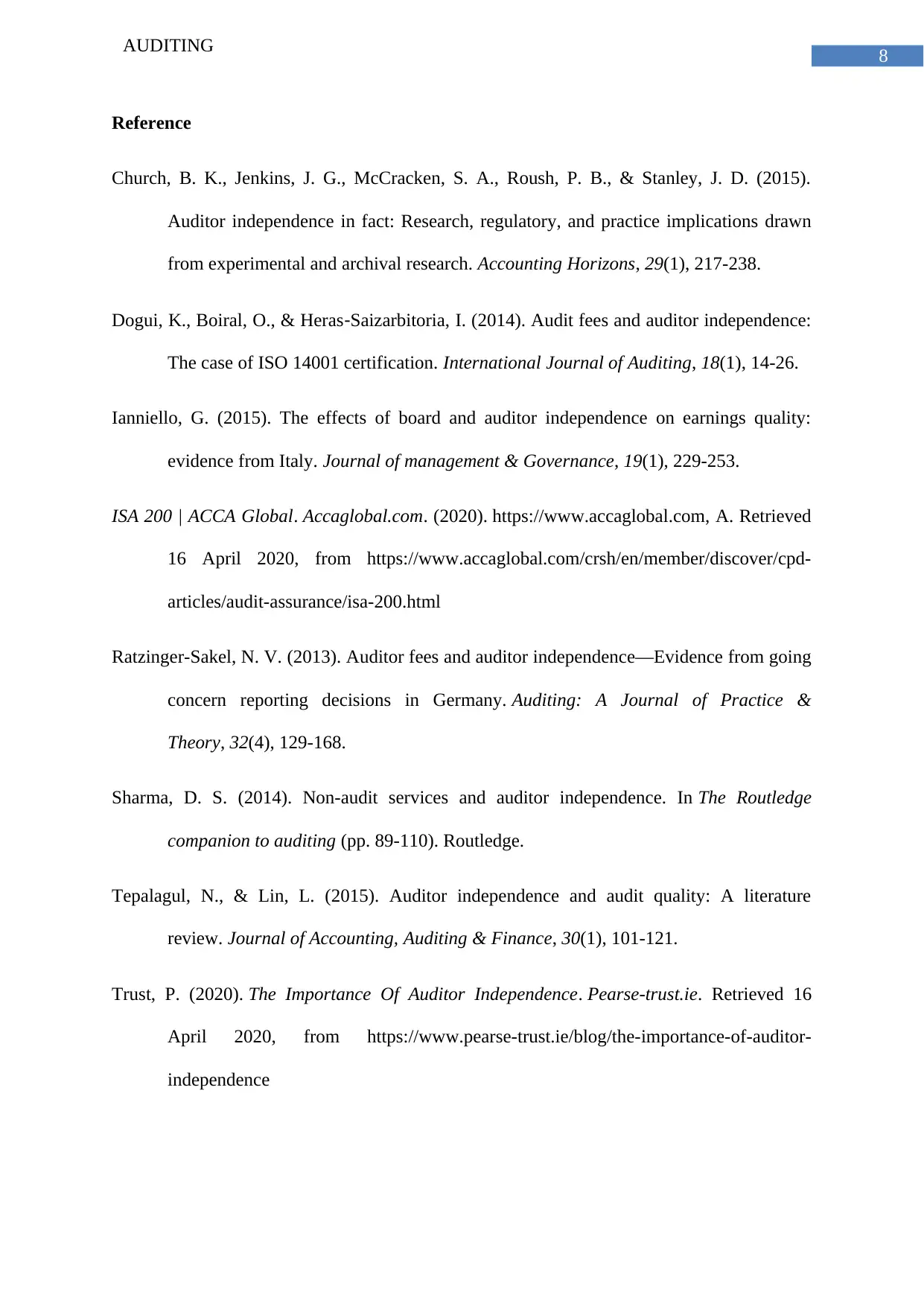
8
AUDITING
Reference
Church, B. K., Jenkins, J. G., McCracken, S. A., Roush, P. B., & Stanley, J. D. (2015).
Auditor independence in fact: Research, regulatory, and practice implications drawn
from experimental and archival research. Accounting Horizons, 29(1), 217-238.
Dogui, K., Boiral, O., & Heras‐Saizarbitoria, I. (2014). Audit fees and auditor independence:
The case of ISO 14001 certification. International Journal of Auditing, 18(1), 14-26.
Ianniello, G. (2015). The effects of board and auditor independence on earnings quality:
evidence from Italy. Journal of management & Governance, 19(1), 229-253.
ISA 200 | ACCA Global. Accaglobal.com. (2020). https://www.accaglobal.com, A. Retrieved
16 April 2020, from https://www.accaglobal.com/crsh/en/member/discover/cpd-
articles/audit-assurance/isa-200.html
Ratzinger-Sakel, N. V. (2013). Auditor fees and auditor independence—Evidence from going
concern reporting decisions in Germany. Auditing: A Journal of Practice &
Theory, 32(4), 129-168.
Sharma, D. S. (2014). Non-audit services and auditor independence. In The Routledge
companion to auditing (pp. 89-110). Routledge.
Tepalagul, N., & Lin, L. (2015). Auditor independence and audit quality: A literature
review. Journal of Accounting, Auditing & Finance, 30(1), 101-121.
Trust, P. (2020). The Importance Of Auditor Independence. Pearse-trust.ie. Retrieved 16
April 2020, from https://www.pearse-trust.ie/blog/the-importance-of-auditor-
independence
AUDITING
Reference
Church, B. K., Jenkins, J. G., McCracken, S. A., Roush, P. B., & Stanley, J. D. (2015).
Auditor independence in fact: Research, regulatory, and practice implications drawn
from experimental and archival research. Accounting Horizons, 29(1), 217-238.
Dogui, K., Boiral, O., & Heras‐Saizarbitoria, I. (2014). Audit fees and auditor independence:
The case of ISO 14001 certification. International Journal of Auditing, 18(1), 14-26.
Ianniello, G. (2015). The effects of board and auditor independence on earnings quality:
evidence from Italy. Journal of management & Governance, 19(1), 229-253.
ISA 200 | ACCA Global. Accaglobal.com. (2020). https://www.accaglobal.com, A. Retrieved
16 April 2020, from https://www.accaglobal.com/crsh/en/member/discover/cpd-
articles/audit-assurance/isa-200.html
Ratzinger-Sakel, N. V. (2013). Auditor fees and auditor independence—Evidence from going
concern reporting decisions in Germany. Auditing: A Journal of Practice &
Theory, 32(4), 129-168.
Sharma, D. S. (2014). Non-audit services and auditor independence. In The Routledge
companion to auditing (pp. 89-110). Routledge.
Tepalagul, N., & Lin, L. (2015). Auditor independence and audit quality: A literature
review. Journal of Accounting, Auditing & Finance, 30(1), 101-121.
Trust, P. (2020). The Importance Of Auditor Independence. Pearse-trust.ie. Retrieved 16
April 2020, from https://www.pearse-trust.ie/blog/the-importance-of-auditor-
independence
⊘ This is a preview!⊘
Do you want full access?
Subscribe today to unlock all pages.

Trusted by 1+ million students worldwide
1 out of 9
Related Documents
Your All-in-One AI-Powered Toolkit for Academic Success.
+13062052269
info@desklib.com
Available 24*7 on WhatsApp / Email
![[object Object]](/_next/static/media/star-bottom.7253800d.svg)
Unlock your academic potential
Copyright © 2020–2026 A2Z Services. All Rights Reserved. Developed and managed by ZUCOL.





